As Nigel sits in his kitchen late on a Wednesday night and pours himself another coffee, his phone finally vibrates. He looks at the text message: “Urgent blood sample from Kettering to Birmingham.” “Right,” he says. “We’re off.” He downs the contents of his cup, grabs his leather riding gloves and leads me outside to his motorbike. We climb on and ride away into the cold night.
Nigel isn’t heading out on a pleasure trip: although he’s not paid for it, his mission is deadly serious. Their name might sound a bit ominous, but the 1,500-strong gang he belongs to is a long way from the Hell’s Angels. They’re called the blood bikers: men and women all over Britain who dedicate a few evenings a week to transporting hospital deliveries across the country as stand-ins for the daytime professionals. They are all volunteers, and in 2013 they responded to around 35,000 urgent requests from hospitals, saving the NHS hundreds of thousands of pounds. They take everything from blood and platelets to medicine and breast milk. “Basically,” says John Stepney, chairman of the Nationwide Association of Blood Bikes (NABB), “anything you can get on the back of a bike.”
Nigel, 61, slighter than the beefy biker of stereotype, has a background that might also seem a surprising match: an army officer in northern Ireland, a finance worker, and finally a porter in an Oxford college. Now he’s retired – but busy. His first stop is Kettering General hospital, about 60 miles from his home in Botley. As usual, he is in a hurry – the blood sample is needed for a patient early the next morning. In situations like this, the work of the blood bikers is essential: without it, urgently needed medical supplies would far more often be stuck in traffic. According to Dr Martin Myers, clinical director of pathology at Lancashire Teaching Hospitals, the work of the blood bikes has made a huge difference to many patients in life-threatening situations. “The blood bikers are vitally important to us,” he says. “They help us at any time of day or night.”
But despite the rush, and despite the fact that they are provided with blue lights and sirens, Nigel and his fellow bikers have to stick scrupulously to the speed limit and stop at every red light. (MI6, bomb disposal units and the coastguard operate under the same strictures.) As a result, says Stepney, “the blue lights are of limited use to us: we don’t have the exemptions... It would be too confusing for the public to see the lights used differently.”
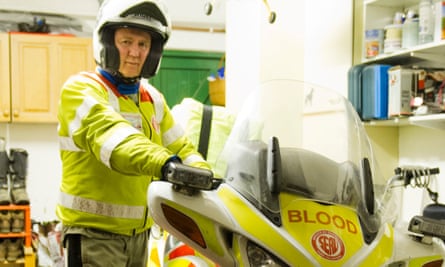
This might be changing. During the last year, a government consultation has considered the prospect of allowing the blood bikers the wider exemptions enjoyed by their professional counterparts in the ambulance and police services – subject to the appropriate training. Now the Department for Transport says in a statement that it’s aware of the problem, and that the regulations will be fixed accordingly next year. For now, though, Nigel takes us as quickly as he can according to the regular rules of the road to Kettering General, which relies on a specialist testing laboratory in Birmingham for some critical tests.
From the darkness of the dual carriageway we approach the bright lights of the hospital. A technician on night duty hands over a specially sealed sample box, Nigel hands over a receipt, and the package is secured in one of the bike’s panniers. Then we’re off through the night again, west towards Birmingham. Nigel carefully filters in and out of the traffic and heads for the front of the jam of late-night commuters queuing to get home, stopping as the lights turn red.
Eventually, we arrive in a desolate car park, lit by the dim glow of a 24-hour Tesco. Standing in wait is Mike, another blood biker, one of Warwickshire’s “freewheeler” volunteer group, identifiable by the fluorescent legend “BLOOD” on the back of his bike. The NABB is made up of 25 regional charities: Nigel’s organisation covers 12 hospitals in Oxfordshire, Buckinghamshire and Northamptonshire. When, as on this occasion, a delivery has to be taken out of one group’s territory, the drivers enter relay mode. “Nice bike you’ve got there,” says Nigel, as the package changes hands. We say goodbye and watch as the box of blood disappears on the next leg of its journey to the Birmingham lab.
Tonight, this nocturnal network is coordinated from the living room of volunteer Erica, who works as the controller for Nigel’s branch, the inelegantly named Service for Emergency Rider Volunteers Oxfordshire, Buckinghamshire and Northamptonshire (ServOBN). Erica, described by the other motorcyclists as “an angel”, joined the blood bikes a little more than three years ago as a way of giving something back to the NHS after seeing the treatment her diabetic husband received following his stroke. “I didn’t want to leave my husband at night,” she explains, “so being a controller was ideal. Controllers start duty at 7pm and work till 7am, and we work Christmas Day, Boxing Day, bank holidays and every weekend.” Erica also has a full-time job, as a sales consultant in a training company. She passed her motorbike test at the age of 50 and, some 13 years later, still takes her husband to hospital appointments on the back of her bike. She regularly tours Europe on holiday to see the motorbike racing, with her husband as pillion. “It’s a really nice way for us to get out and about together,” she explains.
The night begins and ends with the controller, who takes the first call from the hospital then rings one of the two or three riders on duty. “I had four emergency calls last night. The last one was at 1.30am.” The rider – who was on his second journey of the night – didn’t get home until just before 5am, when Erica finally got to sign off; controllers wait for a text from their riders to tell them they’ve made it home safely. “I have bags under my eyes as big as Sainsbury’s carriers this morning,” she laughs. “But I’m lucky, I can always get back to sleep very easily. It’s good, you’re putting something back into the NHS by saving them a fortune.”
Erica is proud of her riders’ efficiency. On one occasion, she recalls, a duty rider was sent on a call only for the hospital to ring back saying that the need was so urgent they would have to “blue light” the request instead – send it in an ambulance. But Erica couldn’t reach the biker to cancel and the ambulance was still despatched, so he and the ambulance ended up on the same journey at the same time. Despite the ambulance’s ability to ignore the speed limit and run red lights, the bike sped through traffic and road works fast enough to deliver the emergency consignment first. The rider left just as the ambulance arrived.
Some question whether the calls taken by the blood bikes are urgent enough to warrant the same exemptions as ambulances. But, says Stepney, “it’s important to remember that, if we were to have the other exemptions of blue lights, they would not be used for every journey”. The decision to use the lights would be taken by the clinical person responsible for requesting the delivery, not the bikers themselves.
“One of the biggest obstacles has been people not taking us seriously and assuming that, because we are volunteers, we don’t act professionally,” Stepney adds. In fact, the volunteers are fully trained, and would receive more training if they were to receive blue light exemptions. With the full exemptions, he adds, the bikers would be able to respond to more emergency runs – and make more of a difference. “A motorbike, when ridden expertly, has huge potential, and this has been proved by our work so far. It is not just about speed, but also about being controlled and agile.”
One piece of evidence for this capacity is in the growing number of responsibilities that the NHS has given the blood bikers. In the past year, the Devonshire Freewheelers have provided what is known as the “golden-hour response” for the NHS Blood and Transplant service – a term that refers to the treatment of a patient in the vital period immediately after an accident. “Here we endeavour to get one of our bikes to any hospital in our patch within an hour in order to transport organ tissue samples to Plymouth,” says Neil Gardener, of the Devon Freewheelers. Then there’s the “milk round”, a new addition to the list: bikers transport donor milk from the milk bank to neonatal units, where it is fed to premature or sick babies whose mothers are unable to provide enough of their own milk. According to Gillian Weaver, president of the European Milk Bank Association and milk bank manager at Queen Charlotte’s & Chelsea hospital, the innovation means that donations from remote areas – particularly in rural Scotland – no longer have to be rejected. The change, she says, is “freeing up funds that were previously spent paying for couriers”.
Operating at night and communicating with only medical staff has hidden the work of Nigel and his fellow blood bikers from the public eye. But the milk round can involve bringing donations of breast milk straight to the homes of mothers. Blood bikers also pick up donations to be taken to the milk bank. Usually, those donations come from mothers with a thriving baby who have enough spare to donate. Sometimes, though, the mother may be bereaved: Stepney recalls going to the home of one mother who had lost her baby only a few days before. “She told me what the baby was called and said that, although she was devastated, it brought her some comfort to think that her milk could help a baby on the other side of the county.”
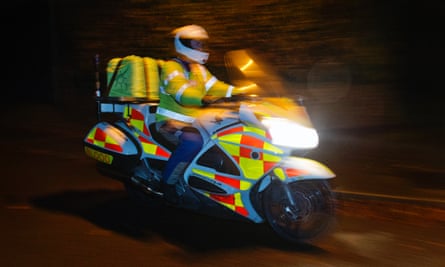
Such encounters have changed the perception of bikers: these days, says Nigel, mothers often approach the bikers when they are collecting for charity to thank them for their work. It’s good, he adds with a laugh, to show that they’re “not just a group of mad, hairy bikers looking for an adrenaline rush”.
It’s hard to imagine a more direct contradiction to that cliche than David Wilbraham, honorary canon of Christ Church, Oxford and a blood biker for just under 10 years. David is one of five full-time police chaplains in Britain and currently works with the Thames Valley Police. “When I heard about the blood bikes I thought, Yes! I could do this,” he says. “It combines the skills and passions I have gained over these many years and you’re doing some good that is making a difference. Me being out doing what I love at night is nothing compared to the family who are at the bedside of a loved one.”
What draws the blood bikers together is a love of motorcycling and a desire to provide a service. “We all love our machines,” Stepney says with a laugh. “But there has always been a natural camaraderie with motorcyclists that translates very well with our service. Many people think we are one of Britain’s best kept secrets.”
If the legislation to have the additional exemptions associated with blue lights in the new year is indeed passed, this may not be the case for much longer. But for now, Nigel and his colleagues have a low profile. We pull back into the garage of his home at 2.30am. Doesn’t he ever just want an early night? “I never wanted to spend my retirement in my slippers!” he says. “I love it – how much help we are I don’t know. But I’m no hero – I don’t have to be up early tomorrow. It’s the people with full-time jobs that I really take my hat off to.”
After removing his riding gloves, Nigel reaches into his pocket for his phone. There’s one more thing to do. “I’m just going to text Erica – to tell her I’ve returned safely,” he says.
As for the blood sample he had been transporting, Nigel will never know what became of it. He has only once had an insight into the importance of his journey: a delivery to the Heart hospital in west London. Even that time, he says, “I have no idea what they were for – but, when I pulled up, a theatre technician in his scrubs was waiting at reception to take the package.” Then he vanished back inside. Most of the time, vital though they are, the blood bikers are in the dark. “I always think it would be nice to know the story behind what we’re carrying,” Nigel says. “We’re really just the messengers.”
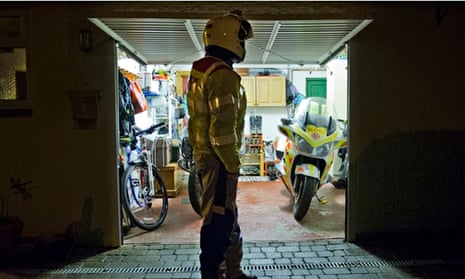
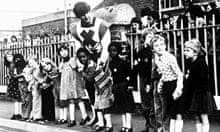
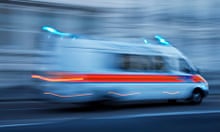
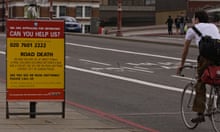
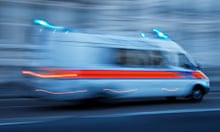
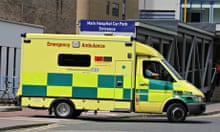
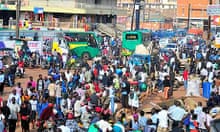
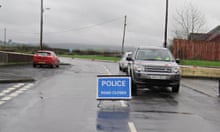

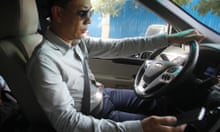
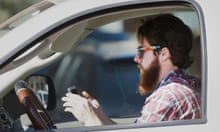
Comments (…)
Sign in or create your Guardian account to join the discussion